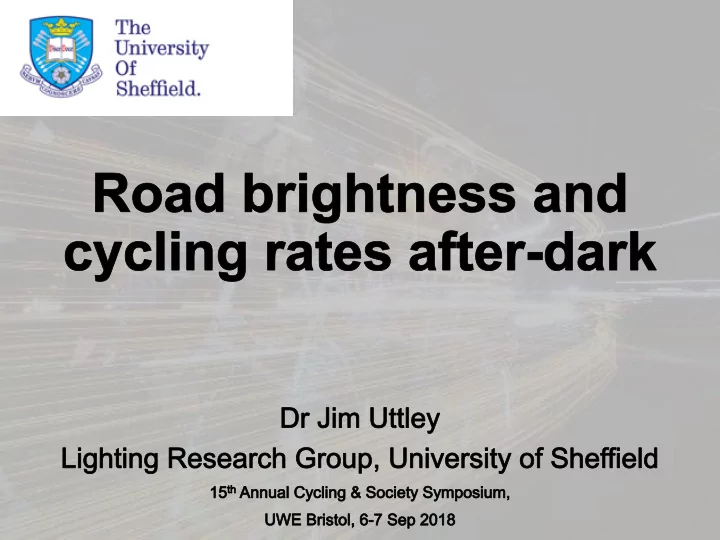

Importance of light for cycling
Importance of light for cycling Survey of potential and current cyclists (N = 1,402) Ratings of 73 potential deterrents and motivators for cycling - 1 (“Much less likely to cycle”) to +1 (“Much more likely to cycle”) Mean rating = +0.50 Mean rating = -0.59 Ranked in top 10 Ranked in top 10 biggest motivators biggest deterrents
Importance of light for cycling Survey of potential and current cyclists (N = 1,402) Ratings of 73 potential deterrents and motivators for cycling - 1 (“Much less likely to cycle”) to +1 (“Much more likely to cycle”) Mean rating for regular Mean rating = +0.50 cyclists = -0.37 Ranked in top 10 Mean rating for potential biggest motivators cyclists = -0.70
Importance of light for cycling
Importance of light for cycling Source: Sustrans (2018), “ BIKElife All cities publication ”, p. 12
Importance of light for cycling Observational data: Effect of darkness on cyclist numbers
Quantifying effect of darkness 23:59 DARK CONTROL HOUR 21:00-21:59 20:00 CASE HOUR 18:00-18:59 Time of day 16:00 DAYLIGHT CONTROL HOUR 15:00-15:59 12:00 08:00 04:00 00:00 Aug Dec Feb Jun Apr Oct Date in year
Quantifying effect of darkness – odds ratio Case hour in daylight ÷ Case hour in darkness Control hour when Control hour when ÷ case hour in daylight case hour in darkness = Odds ratio – effect of darkness on cyclist numbers
Quantifying effect of darkness – odds ratio Case hour in daylight ÷ Case hour in darkness Control hour when Control hour when ÷ case hour in daylight case hour in darkness = Odds ratio – effect of darkness on cyclist numbers Odds ratio > 1 indicates darkness causes decrease in cyclists
Quantifying effect of darkness Significantly greater than 1 – Fewer cyclists after-dark Source: Fotios, Uttley & Fox (2017), “A whole -year approach showing that ambient light level influences walking and cycling”
Lighting data Night-time aerial photography for Birmingham – UK Environment Agency Pixel intensities provide information about brightness and colour of lighting Source: Hale et al (2013), “Mapping Lightscapes: Spatial patterning of artificial lighting in an urban landscape”
Lighting data Source: Hale et al (2013), “Mapping Lightscapes : Spatial patterning of artificial lighting in an urban landscape”
Calculate odds Cycling data ratio at each counter 48 cycle counters in Birmingham Hourly data, 2012-2015 Case hour (18:00) (larger odds ratio = bigger reduction Control hours in cyclists afer- (14:00, 22:00) dark)
Road brightness at cycle counters Calculate average pixel brightness of road segment around counter Convert average pixel brightness to ‘Brightness Factor’ – standardised to average brightness across whole of Birmingham
Brightness and cycling after-dark
Conclusion Cycling should be viable and inclusive option at all times of day Darkness puts people off cycling Only small amount of lighting may be needed to encourage cycling after-dark
Thanks for listening j.uttley@sheffield.ac.uk @AJ_Uttley Any questions, if you’ve not fallen asleep?
Thanks for listening j.uttley@sheffield.ac.uk @AJ_Uttley Any questions, if you’ve not fallen asleep?
Street light density Street light density Number of cycle counters Median street light density category (lights per 100 m) None 8 0 Low 20 2.0 High 20 3.5 Larger odds ratio = greater reduction after- dark
Recommend
More recommend